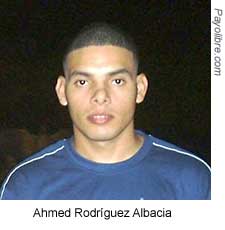New York, December 6, 2006—The Committee to Protect Journalists is outraged at the detention of one Cuban journalist for working for an independent news agency, and of a second for attempting to launch such an agency.
Police and state security forces swooped on the Havana home of independent journalist Ahmed Rodríguez Albacia on Monday, confiscating a computer, tape-recorders, a fax machine and several documents, a neighbor told the Miami-based news Web site Cubanet. Rodríguez Albacia, a reporter for the independent news agency Jóvenes sin censura, is being held incommunicado at the capital’s 100 y Aldabó police station, human rights activist Juan Carlos González Leyva told CPJ.
Authorities told Rodríguez Albacia’s family that he could be held without charge for at least one year, González Leyva said. The journalist was detained by local police for two days in September but no charges were filed. In an interview with CPJ after his release, Rodríguez Albacia said that the police had warned him that if he continued working as an independent journalist, he would go to jail.
In another case, a municipal court in the central town of Sancti Spíritus sentenced opposition activist Raimundo Perdigón Brito to four years in prison on Tuesday for setting up an independent news agency.
Perdigón Brito, a human rights activist and dissident, was convicted on charges of “social dangerousness,” according to press reports and CPJ sources. Authorities often use this vaguely worded charge to silence critics. Under article 72 of the Cuban Penal Code, “any person shall be deemed dangerous if he or she has shown proclivity to commit crimes demonstrated by conduct that is in manifest contradiction with the norms of socialist morality.”
Local authorities detained Perdigón Brito on November 29 after he was called in for questioning, independent journalist Guillermo Fariñas told CPJ. Perdigón Brito was told that he would be released and allowed to continue his work as an opposition activist if he closed down the independent news agency Yayabo Press, which he and his sister Ana Margarita Perdigón Brito had opened on November 17, said Fariñas.
Perdigón Brito and his sister took a journalism course with Fariñas in 2005 and reported briefly for the independent agency Cubanacán press, said Fariñas. However, they had not yet written a story for their new agency.
“Cuban authorities are now not only jailing journalists but also would-be journalists,” said CPJ Executive Director Joel Simon. “The four-year prison sentence handed down to Raimundo Perdigón Brito before his fledgling news agency had even published is a travesty. We condemn his imprisonment and the arrest of our colleague Ahmed Rodríguez Albacia. We call for the release of both men and of the other 24 journalists in Cuban prisons.”
